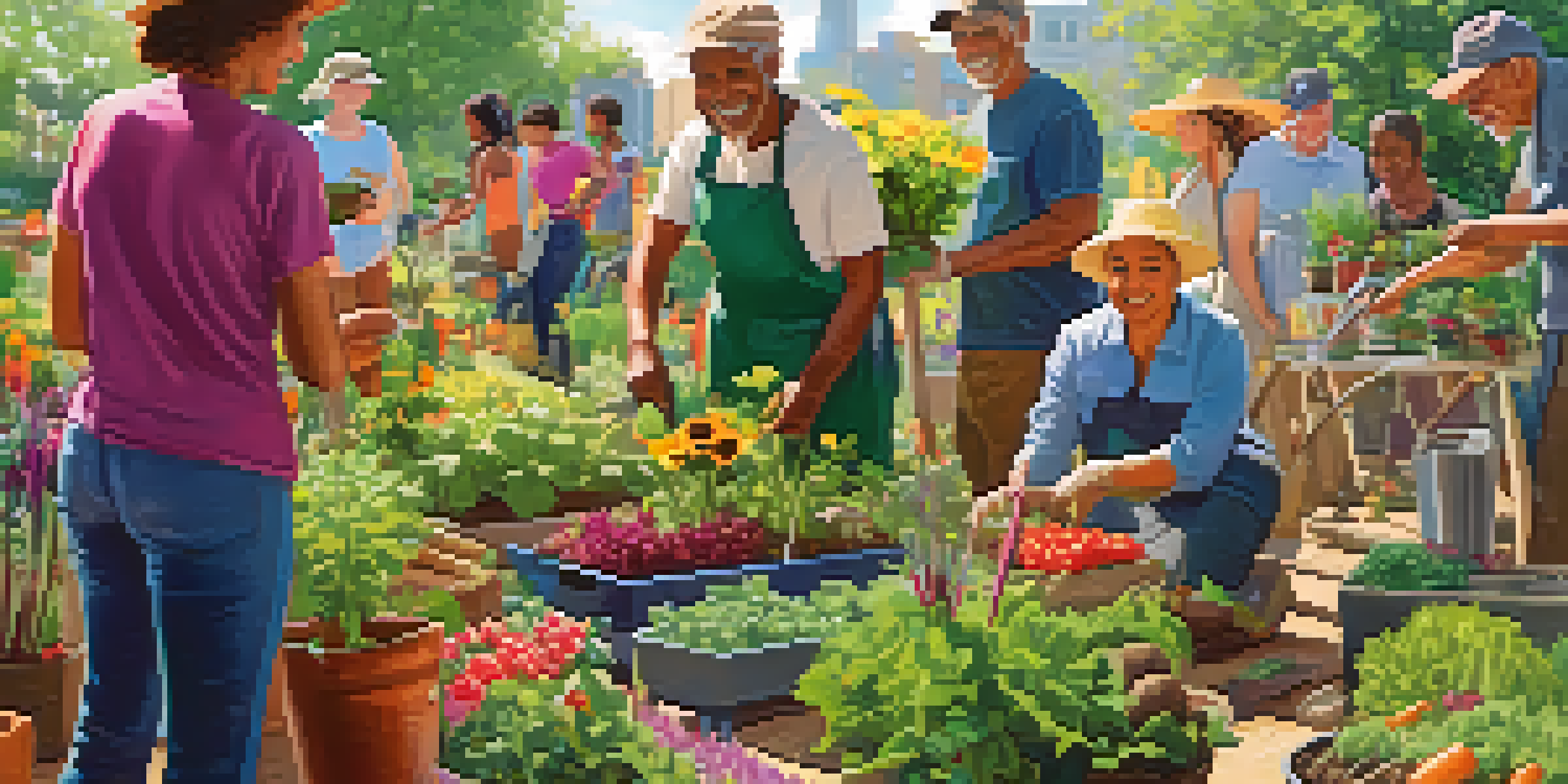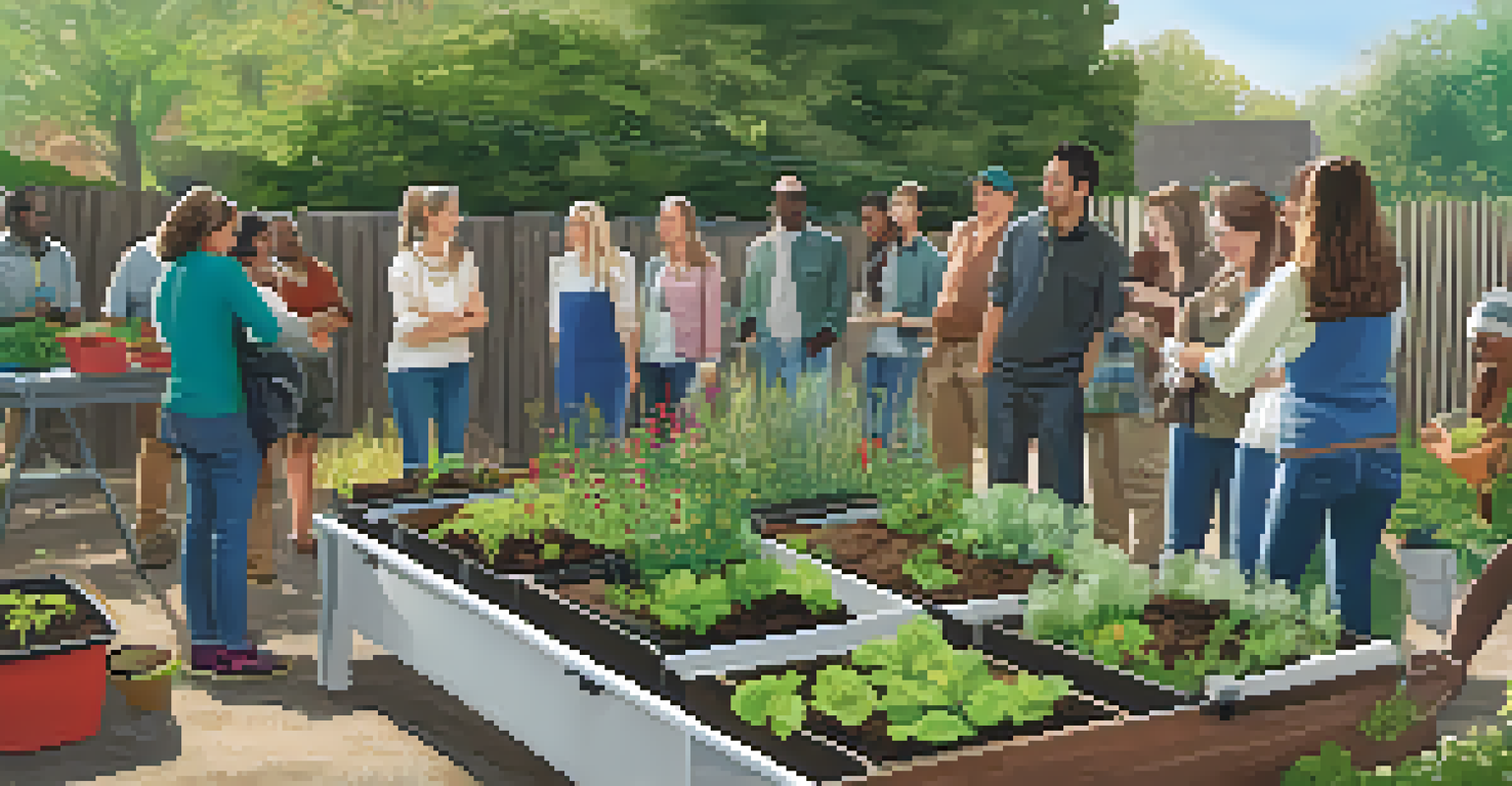Community Gardens: Growing Vegan Food and Sustainability Together

What Are Community Gardens and Their Benefits?
Community gardens are shared spaces where individuals come together to grow plants, primarily fruits and vegetables. These gardens serve as a hub for local communities, fostering connection and collaboration among neighbors. Not only do they provide fresh produce, but they also contribute to the overall well-being of the community by encouraging a healthy lifestyle.
To forget how to dig the earth and to tend the soil is to forget ourselves.
Beyond the beauty of blooming flowers and thriving vegetables, community gardens offer a plethora of benefits, including promoting biodiversity and educating members about sustainable practices. They can transform empty lots into vibrant green spaces, thereby improving the neighborhood's aesthetics and property values. Plus, they often become a safe haven for local wildlife, helping to maintain ecological balance.
Moreover, community gardens can play a significant role in addressing food deserts, areas lacking easy access to fresh produce. By cultivating their own food, community members can enjoy healthier, vegan options, reducing their reliance on processed foods. This not only supports individual health but also enhances community resilience.
The Vegan Movement and Its Connection to Community Gardens
The vegan movement emphasizes plant-based living, which aligns perfectly with the mission of community gardens. By growing their own vegetables and fruits, gardeners can embrace a lifestyle that is both sustainable and compassionate. This hands-on approach allows individuals to witness the entire lifecycle of their food, fostering a deeper appreciation for what they eat.

Community gardens often become a platform for education, where people can learn about veganism, nutrition, and sustainable agriculture. Workshops and events held in these spaces can introduce participants to new recipes and cooking techniques, making veganism more approachable. This shared learning experience can inspire more people to consider a plant-based diet as a viable option for their health and the environment.
Community Gardens Boost Local Health
These shared spaces provide fresh produce, promote healthy lifestyles, and address food deserts in communities.
Moreover, the sense of community that blossoms in these gardens can help dispel myths about veganism being isolating or elitist. Instead, they create a welcoming environment where individuals from diverse backgrounds come together to share knowledge and resources, making veganism more accessible and enjoyable for everyone.
Sustainable Practices in Community Gardening
Sustainability is at the heart of community gardening, with practices designed to minimize environmental impact. Many community gardens utilize organic gardening methods, avoiding harmful pesticides and fertilizers. This approach not only protects the ecosystem but also ensures that the food grown is healthy and free from chemicals.
The future will belong to those who give the next generation reason for hope.
Composting is another common practice in community gardens, turning kitchen scraps and yard waste into nutrient-rich soil. This closed-loop system not only reduces waste but also enriches the garden's soil, promoting healthier plants. By recycling organic matter, community gardeners take a proactive stance in combating climate change and reducing their carbon footprint.
Water conservation techniques, such as rainwater harvesting and drip irrigation, are also frequently employed in these gardens. These methods ensure that every drop counts, especially in areas prone to drought. By adopting such sustainable practices, community gardens serve as a model for how individuals can make eco-friendly choices in their own lives.
Building Community Through Gardening
One of the most profound aspects of community gardens is their ability to foster connection among individuals. Working side by side to cultivate plants creates a sense of camaraderie and shared purpose. This social interaction can help break down barriers, allowing people from varied backgrounds to connect over a shared love of gardening and healthy food.
Community gardens often host events such as potlucks, festivals, and volunteer days, creating opportunities for members to gather and bond. These gatherings not only reinforce community ties but also celebrate the fruits of everyone's labor. The shared experience of growing and enjoying food together can strengthen relationships and build lasting friendships.
Education Sparks Vegan Awareness
Community gardens offer workshops that educate members about nutrition, sustainable practices, and veganism, making plant-based living more accessible.
Moreover, these gardens can serve as a safe space for dialogue and collaboration on broader community issues. By bringing people together, community gardens can spark discussions about food justice, sustainability, and local politics, empowering individuals to become advocates for positive change in their neighborhoods.
The Role of Education in Community Gardens
Education is a cornerstone of community gardening, with many gardens offering workshops and classes on various topics. From composting to plant care, these educational opportunities empower individuals with knowledge and skills that can enhance their gardening experience. This emphasis on learning fosters a culture of curiosity and experimentation among community members.
Additionally, community gardens often partner with local schools to provide students with hands-on learning experiences. These collaborations can teach children about the importance of nutrition, sustainability, and environmental stewardship. By engaging younger generations in gardening, we cultivate a sense of responsibility toward nature and encourage them to make informed food choices.
Furthermore, these educational initiatives can include information about vegan diets and how to incorporate more plant-based foods into daily meals. By providing resources and support, community gardens can help individuals transition to a vegan lifestyle, promoting health and sustainability within the community.
Challenges and Solutions for Community Gardens
While community gardens offer numerous benefits, they also face challenges such as land access and funding. Securing a suitable space can be difficult, especially in urban areas where land is scarce. Additionally, maintaining a garden requires financial resources for tools, seeds, and maintenance, which can be a barrier for many communities.
To overcome these challenges, community members can work together to seek grants and sponsorships from local businesses and organizations. Collaborative efforts to fundraise can also help alleviate financial burdens. By pooling resources and talents, community gardens can thrive despite these obstacles.
Gardens Foster Community Connections
By bringing people together to garden and share experiences, these spaces enhance social ties and empower individuals to advocate for local issues.
Another common challenge is managing diverse opinions and expectations among community members. Open communication and regular meetings can help ensure that everyone feels heard and valued. Establishing clear goals and responsibilities can also promote harmony and collaboration, ensuring that the garden remains a positive space for all.
The Future of Community Gardens in a Vegan World
As the vegan movement continues to grow, community gardens are poised to play a vital role in promoting plant-based living. These gardens can serve as living laboratories for sustainable practices, showcasing the benefits of vegan diets and responsible agriculture. By demonstrating the power of growing one's own food, community gardens can inspire more people to embrace a vegan lifestyle.
Moreover, community gardens can act as a catalyst for broader environmental initiatives, advocating for policies that support sustainable agriculture and food justice. By uniting voices and efforts, these gardens can influence local governments and encourage them to prioritize green spaces and community-driven projects.

In the coming years, we can expect to see more community gardens popping up in urban and rural areas alike. As people recognize the importance of sustainability and healthy eating, these gardens will become essential spaces for learning, connection, and advocacy, helping to shape a more compassionate and eco-friendly world.